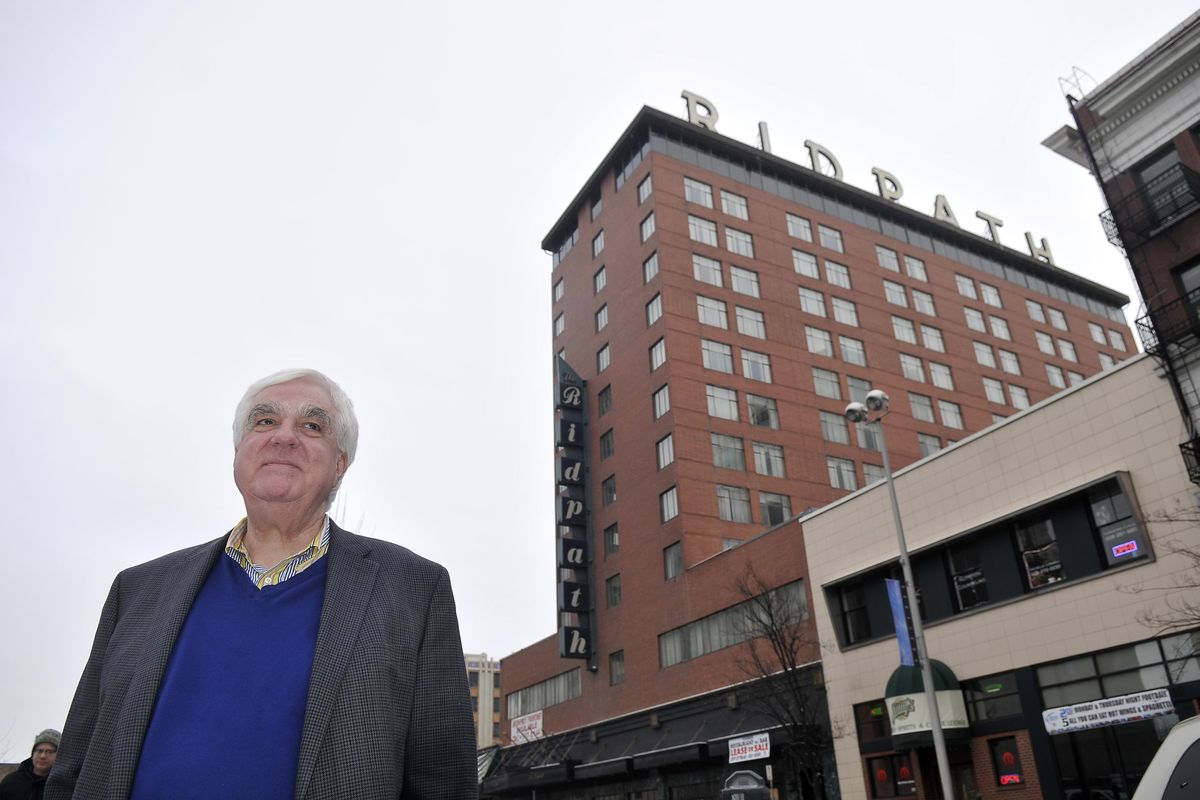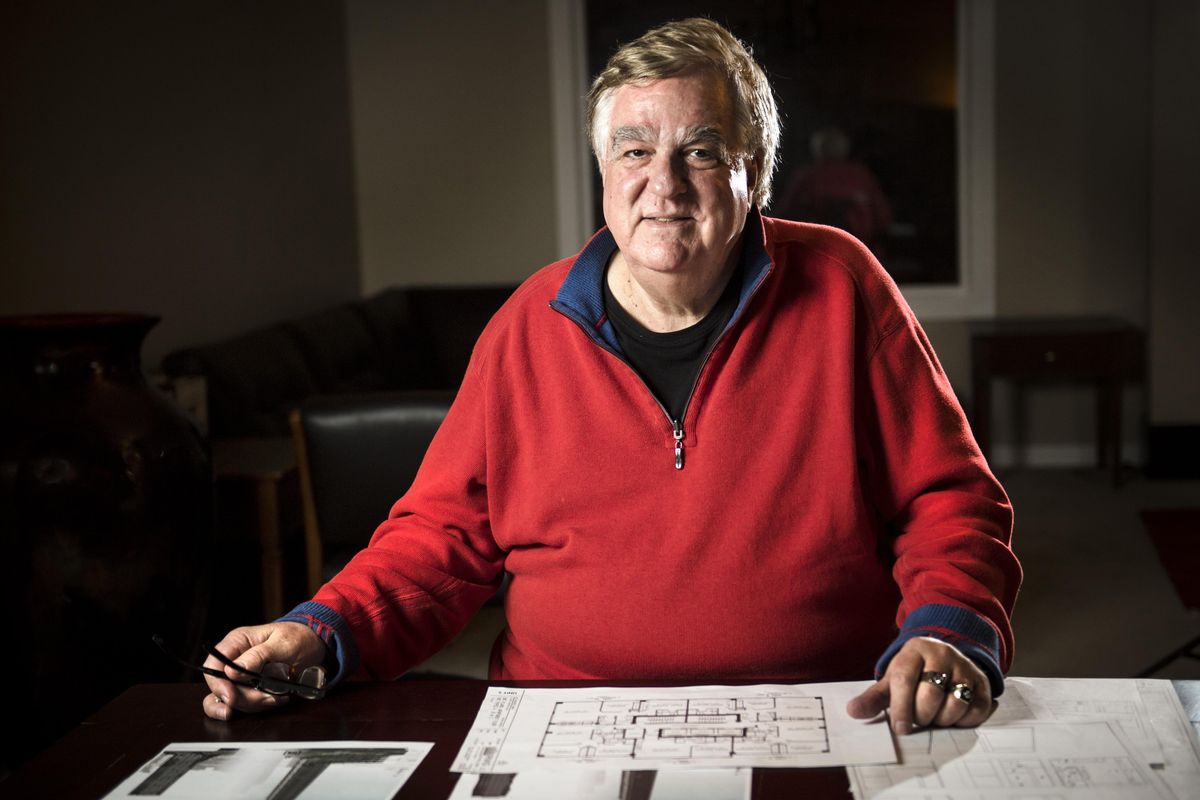Wells stripped of Ridpath authority as investors vow to complete downtown Spokane project
In this Jan. 24, 2013 photo, developer Ron Wells stands outside the old Ridpath Hotel. Investors in an effort to renovate the hotel have stripped Wells of his authority, citing recent charges that he defrauded insurance companies in the past. (Jesse Tinsley / The Spokesman-Review)Buy a print of this photo
Investors behind the renovation of the Ridpath Hotel into affordable housing have stripped Ron Wells of his authority over the project in an effort to protect the project from recent charges that Wells defrauded insurance companies.
Last month, a federal grand jury named Wells as part of a scheme to defraud insurance companies and banks through a series of staged car collisions. During a five-year span, Wells and others are accused of filing fake claims to collect more than $6 million.
“After the news came out, we decided that Ron should be removed. His ownership interest still exists at this point,” said Paul Mann, a longtime friend of Wells and an investor in the project. “He’s not a signatory. Not a decision-maker.”
Wells, the face of and force behind the Ridpath project, has been bedridden for three months because of an undisclosed illness and hospitalization. He hasn’t been part of the decision-making process for some time, Mann said.
Mann, who had Wells’ power of attorney during his convalescence, is now manager and signatory for the project, meaning only he can approve anything related to the Ridpath.
“Obviously, we’re worried about how this will affect the project,” Mann said. “You don’t want the project to be tainted in any way by what’s been alleged, but it’s better to just make that change.”
The $22 million renovation of the 206-unit Ridpath is financed through a mix of public and private dollars.
It’s owned by a company called Ridpath Owners LLC, which is comprised of Wells, Mann, Lawrence Brown Jr. and, in part, James Topliff. Collectively, the four men have invested more than $1 million in the project.
The city of Spokane lent $1.75 million to the project using federal Department of Housing and Urban Development loans.
Marlene Feist, the city’s spokeswoman, said the city’s financial team is reviewing the project, but noted it’s unlikely anything will change with the loan.
“We’ve seen some pretty good progress,” she said. “Many of the units are rented out and more will be as the work is being completed. Cash flow will start moving in on this project.”
She noted that the goals of the loan were to “remediate blight and create more affordable housing projects in the core,” and the Ridpath does both.
The Washington State Housing Finance Commission loaned the Ridpath project $2 million.
R4 Capital is a nationwide affordable housing tax credit syndicator, lender and asset manager that has raised more than $2.3 billion in Low Income Housing Tax Credit equity from 80 institutional investors. The company has offices in several cities and its portfolio includes 250 properties located in 42 states, the District of Columbia, Puerto Rico and the Northern Mariana Islands.
Following approval from the Washington State Housing Finance Commission, R4 supplied more than $6 million in tax-credit equity and furnished the project with a $10 million tax-exempt bond.
The affordable housing tax credit program, which underlies the Ridpath’s renovation, is supported by banks and investors and has funded nearly all affordable housing projects nationwide since the 1980s.
Greg Doble, a senior vice president and director of asset management for the company, referred questions to Mann.
“We’re a limited partner in the development,” he said in a voicemail.
Mann insisted the Ridpath would be completed, and noted that “the project is really in the final stages right now. We don’t think it’s going to be ended or disrupted in an organizational sense.”
About 120 tenants live in the hotel tower. Though the project was first anticipated to have tenants in October 2017, work was delayed because of unforeseen complications in the aging structure, which sat vacant for a decade after it closed in 2008. The current Ridpath tower opened in 1952, replacing the original Ridpath, which was destroyed two years earlier in a fire.
“We’re in the final weeks of construction, so it’s been a long journey,” Mann said. “This is an important project for downtown Spokane. Certainly, we’ve had some difficulties in bringing it to fruition, but it’s a block that’s been blighted for a long time.
“This is a critical need for the health of downtown, and we’re serving a sector of the population that needs it.”
Editor’s note: This article was changed on Jan. 4, 2019 to note that the current Ridpath building opened in 1952. The original Ridpath opened around 1900 but was destroyed by fire in 1950.

